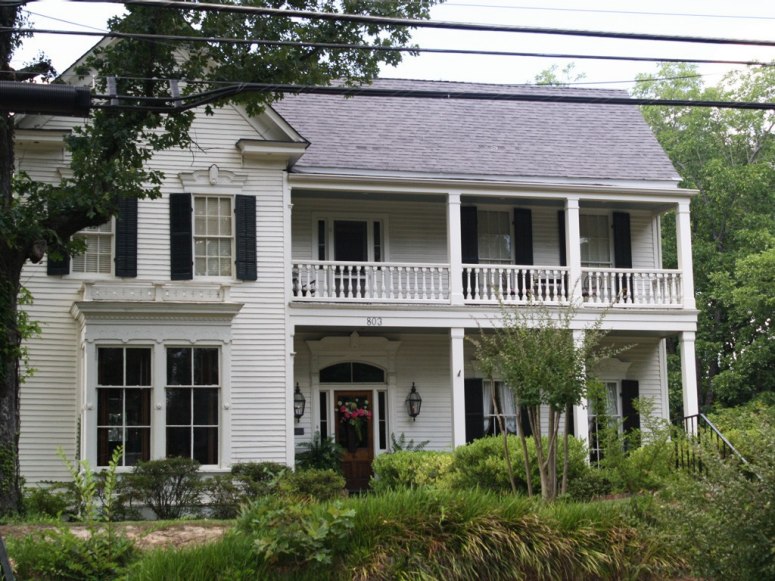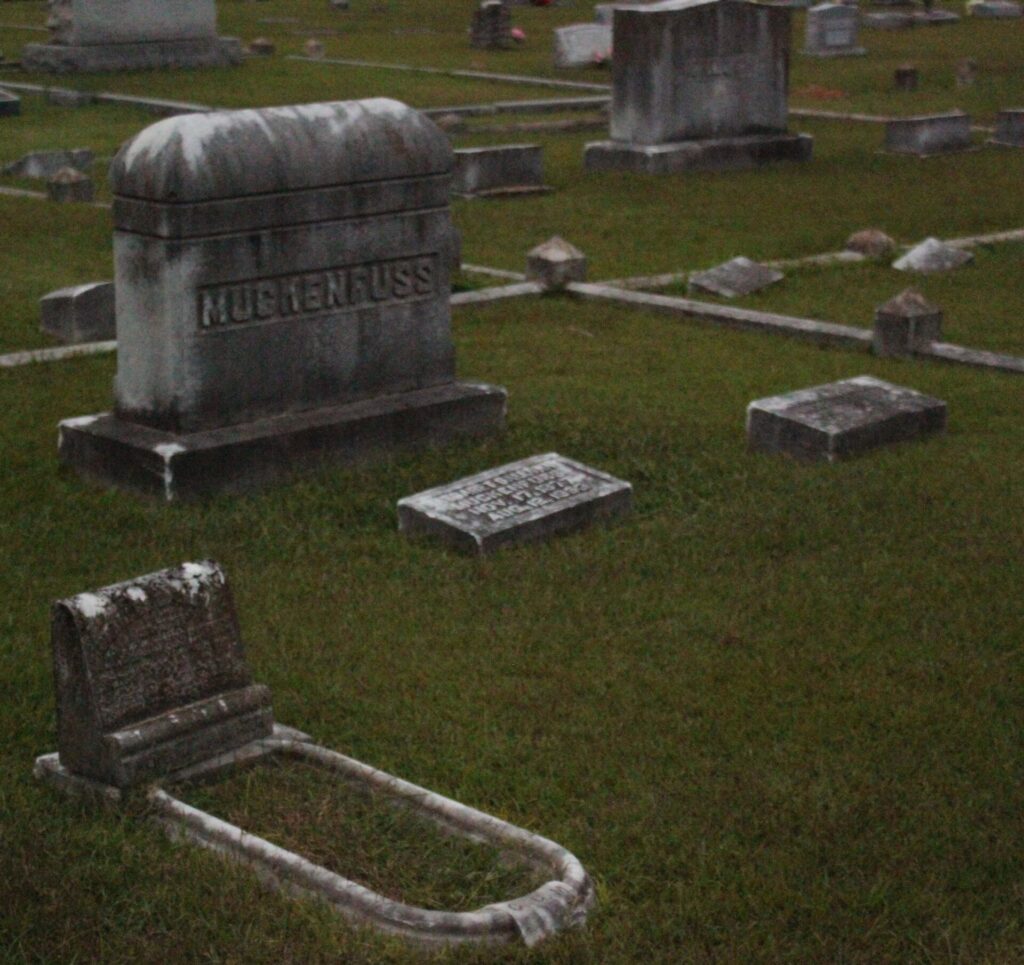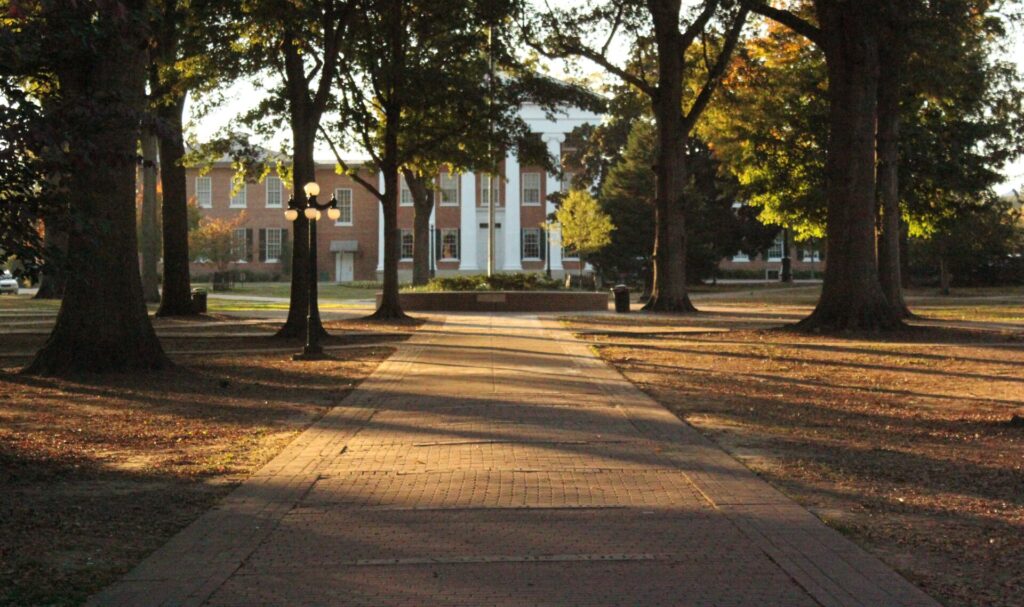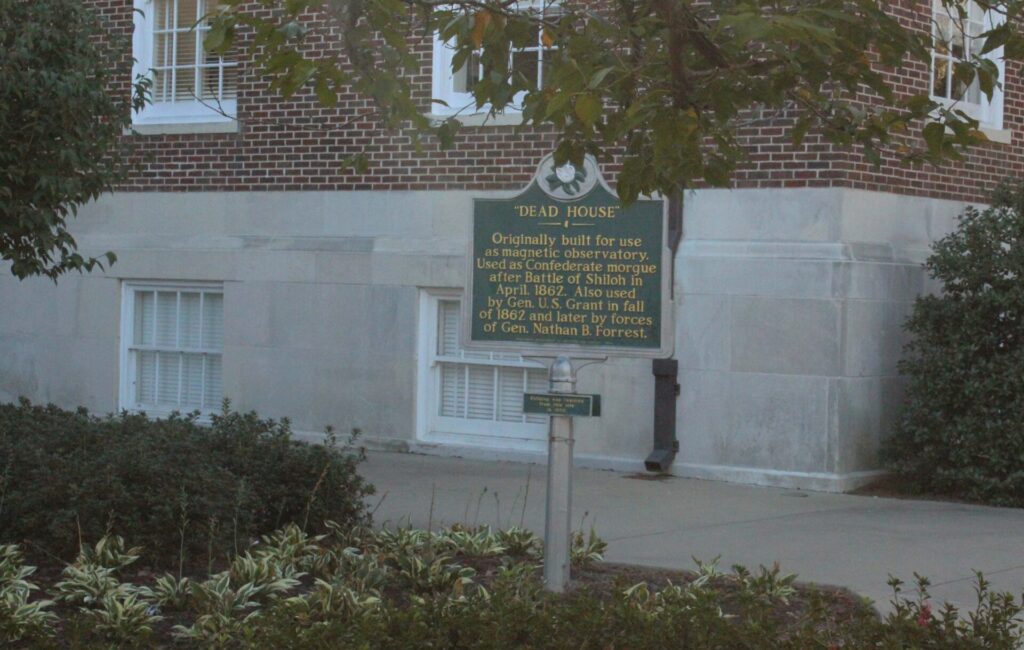Our city’s history is visible even now from our Courthouse that survived the Civil War flames to William Faulkner’s Rowan Oak surrounded by his beloved Bailey Woods that has seen the Chickasaws to the Lyceum with its bullet holes still present from the 1962 riot. But are only the buildings history’s remnants? Here are whispers for those who want to meet the deceased who chose Oxford as its afterlife.
Rowan Oak

William Faulkner loved the Gothic nature of Rowan Oak’s gardens so he made up a ghostly tale to entertain his guests amid the tall cedars. He never wrote this story down so Rowan Oak’s curator William Griffith has heard “over 10 different versions from 10 different people,” but noted the most well-known is the one that Dean Faulkner Wells, William’s niece, wrote down in her book, The Ghosts of Rowan Oak.
Since the house was built by Colonel Robert Sheegog in 1844 Faulkner invented the tragic Judith Sheegog, the colonel’s only daughter. She was unlucky in love so took herself onto balcony and threw herself to her end. Her father found her body the next morning and buried her in a shallow grave under one of the magnolia trees in front of the home.
And as rumors would have it people wondered here and there whether William Faulkner himself haunts Rowan Oak. Griffith said that after 14 years as the property’s curator he has never encountered a supernatural event although he wishes he could. He admitted he leaves Rowan Oak at sundown so the lack of his personal encounters does not mean the grounds are phantom-free.
Meek-Duvall House

This house is close to the campus on University Avenue. Constructed in 1878 it was the first home of newlyweds William and Estelle Faulkner. They rented a part of the Victorian-esque home in 1929 from Ms. Elma Meek, who was responsible for naming the university’s first student yearbook ‘Ole Miss.’ This name later became the university’s nickname. Aside from this historical tidbit the house may have a permanent resident.
Teresa Duvall Flautt and her family first moved into the house in the early 1960s. Her father, who spent his childhood down the street from the Meek-Duvall house, remembered stories of a lady in a long black gown who stood at top of the staircase. Flautt never saw her but recalled hearing footsteps pass by her bedroom then the creaking of the rocking chair down the hall. She screamed and her parents too screamed and ran upstairs. Her parents told her they heard the rocking chair when she did. The family continued to hear creaks and odd noises until Flautt and her sister sold the home in 1997.
Beth Doty is the current owner of the house. She said, “We bought our house and totally renovated it in 1999 and have lived here for 15 years. We have never had any experiences of ghosts. We completely renovated the house down to the studs. Maybe they left.”
Old Sardis Road

Claire Colquitt, a senior psychology major at University of Mississippi, said, “Supposedly there is a phantom car on Old Sardis Road.” A quick Google search yielded a story from www.ghostsofamerica.com from “Elaine.” The post below is ad-verbatim from the site:
“My daughter and her son had each an individual experience with a fast moving truck coming up behind them as they were driving. They both in each experience felt the truck was going to run into them. Both stated that they took their eye off the truck to watch the road and when looking again for the fast moving truck it was no longer there. This is what she says was on Sardis Road and is now called County Road 100 near Oxford, Mississippi.”
However, the Old Sardis Road is now College Hill Road.
St. Peter’s Cemetery

Sarah Beth Wiley, HottyToddy.com’s creative director, has lived in Oxford as a child. She remembered a ghoulish trick kids used to play to scare themselves. She said, “First you find the Muckenfuss tombstone right next to the Faulkners’ gravesite. Then you walk around the headstone three times saying the name ‘Muckenfuss’ three times. And then something happens…but I have no idea.”
Oxford Underground Tunnels

Persistent rumors tells James Meredith used the underground tunnels to walk back and forth between Oxford and the university to avoid alterations with people who weren’t welcoming.
These tunnels are not so much as haunted as they are cramped, wet and graffiti-laden. Some tunnels are dark so people tend to shy away. Entrances to these tunnels can be either found in the woods near the Chancellor’s house or at the end of the St. Peter’s Cemetery.
Here is a video uploaded last November by John Arnold. Despite the vertical filming one can see what resides within the underground tunnels.
[dhr]
The University of Mississippi, along with Oxford, has seen the horrors of the Civil War. Its entire class of 1862 enlisted, became Company A, 11th Mississippi also known as “University Greys” and all but one died during Pickett’s Charge at the Battle of Gettysburg in 1863. The university itself, spared from the Union’s fires, became hospital grounds and now resting grounds for hundreds of fallen soldiers. Ghostly stories has not left the university since those bloody days.
The Lyceum

The Lyceum was a Confederate hospital that treated fallen soldiers, both Union and Confederate, especially those who were wounded after the Battle of Shiloh in now Hardin County, Tenn. It is an accepted Oxonian folklore that on Halloween at midnight the spirits of the fallen soldiers walk through the Circle, past the Confederate statue that marks where the University Greys put their books down one last time, to their grave site behind Tad Smith Coliseum.
Confederate Cemetery

Many students who have spirited the newcomers and visitors to the Doorknob to the Universe first drags them through the Confederate Cemetery behind the Tad Smith Coliseum. The mass grave holds more than 700 bodies of which a handful were identified and reburied. The Albert Sidney Johnston Chapter of the United Daughters of the Confederacy is responsible for placement of both the lone stone monument and the brick wall around the grave site.
It is said that the lone marker is due to the landscapers removing the original markers in 1900 to cut the grass. The workers did not know which markers went where after the job so the singular marker was then erected with the names on it instead. This may have spurred rumors that it was a mass grave instead of a cemetery of individual graves for both Union and Confederate soldiers. There was an iron fence originally but it fell to disrepair in 1936. The brick wall replaced it with bricks from the previously-burned Gordon Hall on campus. Whether there is a ghostly presence has not been publicly reported.
Guyton Hall

An excerpt from the Daily Mississippian article by Sara Rogers published this past Tuesday, Oct. 28.
“It has been rumored for years that Guyton Hall is haunted, as it was previously used as a hospital with patients being held on the third floor. Subsequently, this is where the event has held the haunted house each year.
‘This used to be the medical school, and the morgue was on the third floor,’ Jenny Echols, elementary education grad student said. ‘Some say the ghosts of those who died there never left.'”
Farley Hall

A historic marker standing outside of the building alerts students and visitors to Farley’s past. It reads “Dead House.” The small, lead-lined building was originally constructed to become a magnetic observatory. The Civil War caused this dream to diminish when Farley became a morgue after the Battle of Shiloh in April 1862.
Charlie Mitchell, assistant dean of Journalism, said, “The Lyceum was a hospital during the Civil War. The dead were wrapped and carried from the Lyceum to here to wait for the next train to take them away. I’ve never heard of any students complaining of a haunting.”
Farley is also one of three buildings on university campus formerly known as Lamar Hall. The school of law moved into the building in 1931 and there remained until 1978. The building had first of its many expansions in 1958 when a three story-extension was added onto its back. This expansion destroyed the building and rebuilt it, thus desecrating its original design.
Daniel Barefoot, author of Haunted Halls of Ivy: Southern Colleges and Universities, (pub. 2004) wrote this passage of Farley Hall on page 101:
“At night, unexplained noises in the portion of the building that serves as the library have frightened numerous people. After working amid the supernatural sounds on the upper level of Farley for two weeks, one graduate student refused to ascend the stairs alone.”
Fulton Chapel

Theatre majors know well the dread of being the only person in the Fulton Chapel at night. It is rumored that if a person is on the stage silhouettes are seen at the entrance doors as well as whispering voices.
Ventress Hall

Here is an excerpt from Haunted Colleges and Universities: Creepy Campuses, Scary Scholars and Deadly Dorms by Tom Ogden on page 119:
“Most people who think the building is haunted merely feel an uneasy presence when they’re inside, but window blinds have been known to flatten on their own and unexplained silhouettes have been seen in the second story window when the building was supposedly empty.”
Deaton Hall

It is a widespread belief that Eula Deaton, a deceased faculty member, haunts Deaton Hall. Eula Deaton was the first woman to earn a master’s degree and also the first woman to serve as faculty for the English Dept. Miss Deaton died before Deaton Hall was built in 1952. However many former Deaton residents report her spirit as malevolent and rumored that she caused an electrical accident that killed two students in the building’s elevator in 1985.
This haunting is also mentioned in Daniel Barefoot’s Haunted Halls of Ivy: Southern Colleges and Universities on page 101.
Saint Anthony Hall – Delta Psi fraternity
The fraternity house has one haunted room: the Sigma room where a brother named Jim Bridges lived. In 1964 Bridges died in a car accident on his way back from a football game against LSU in Baton Rouge. Fraternity men report the room’s floor creaks when stepped on and that it has creaked when nobody was near. The closet door in the room sometimes open and stops halfway. Bridges’ spectre has been observed standing in a doorway or walking about the fraternity’s library. The fraternity men respect the ghost’s presence as it is one of their brothers.
Here is a short quote from a fraternity brother who resided in the haunted Sigma Room.
Lenior Hall – formerly Zeta Tau Alpha house

Here is an excerpt from Haunted Houses of Ivy: Ghosts of Southern Colleges and Universities by Daniel W. Barefoot on page 101:
“The disembodied footsteps of a girl who died in the former Zeta Tau Alpha house can yet be heard on the upper floors of the structure late at night.”
This spirit is unnamed but its legend was rampant from the 60s to the mid-70s until ZTA disbanded in 1986. Then there were reports of seeing the ghostly lady in the mirrors, the ghost entering the rooms then disappearing, an invisible presence following people up and down stairs, and finally the closets’ contents being rearranged while people were in the room.
[dhr]
The article has been corrected today (10-31-2014) on the Meek-Duvall house paragraph due to its location inaccuracy. The photo has been updated.
Callie Daniels is the staff reporter for HottyToddy.com. She would love to hear about more haunted places and legends so please email her at callie.daniels@hottytoddy.com.

